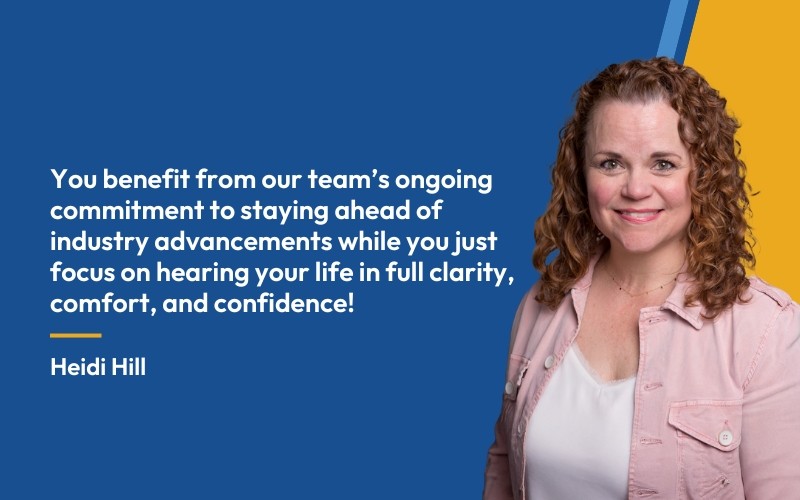Published on
Apr 9, 2025
|
2 min read
Life presents numerous challenges, and for many, one battle is seeking a perfect auditory experience.
Picture this: You're in a bustling restaurant trying to focus on your dinner companion. The clinking of cutlery, the background chatter, and the loud music make it almost impossible to catch their words, and you end up asking for repetition, again and again.
Despite having normal hearing, comprehending voices and faint sounds in noise can be stressful for some. Often, this is not about the ears failing; it's about the brain's interpretation of those sounds, which is a condition known as auditory processing disorder (APD).
Understanding APD
APD affects how the brain processes auditory information. Even with average hearing capabilities, you might find it difficult to interpret sounds, especially in environments loaded with background noise.
The auditory system operates through a complex network similar to intricate electrical wiring, connecting the ears and brain. Our auditory nervous system enhances crucial information, usually speech, while suppressing irrelevant noise. This needs to happen swiftly, surpassing the processing speed of any other sense.
A mishap anywhere in this chain can lead to auditory processing problems. Imagine trying to locate sounds, distinguish between "pat" and "bat," or recognize melodies and speech patterns—and having difficulties. Each of these tasks can become more and more difficult for someone with APD.
How APD Differs From Traditional Hearing Loss
It's crucial to distinguish APD from typical hearing loss. Hearing loss is an issue with sound detection, as in your ears' inability to pick up sounds as loudly or clearly as before.
On the other hand, APD is a breakdown of the neural encoding process of sounds. It's about how well sound qualities like pitch and loudness are transformed into neural signals that the brain deciphers. Even in environments where speech is typically easy to understand, you might find communication challenging.
Signs & Symptoms of APD
People with APD may display a variety of signs:
Difficulty grasping speech amidst background noise
Misinterpreting spoken words
Constantly requiring repetition
Struggling with following multistep directions
Becoming easily distracted by ambient sounds
Poor musical or rhythmic abilities
Each of these symptoms, over time, can lead to increased listening effort, fatigue, social withdrawal, and, in some cases, even depression.
Daily Life, Communication, and Learning With APD
The impact of APD reaches beyond mere sound comprehension. It's about communication, the ability to learn efficiently, and even how you navigate daily life scenarios. Language and literacy skills can suffer, as APD affects phonological processing and spelling.
Behavioral issues might arise, often leading to social challenges or even academic struggles. Every day might feel like a test of resilience as basic interactions become exhausting.
But amidst these challenges, there's hope and a path forward. Recognizing the signs early and seeking a professional evaluation can lead to better management strategies.
Moving Toward a Solution
If you’re looking for ways to help work through your APD challenges, you can rest assured that with our team you are seen as much more than a patient; you're welcomed into a community where your auditory health becomes a shared journey with seasoned experts by your side.
With innovative APD assessments like CogniHear, you and your hearing health expert will delve beyond mere surface-level hearing issues, targeting the root causes for effective, personalized treatment plans to help you hear the life you love most.
If these scenarios resonate with you, consider an auditory processing evaluation with our team! You can guarantee expert care and personalized solutions that let you fully engage with the symphony of life.
Request a callback to get in touch with our team, and we’ll get in touch with you as soon as we can to help. Alternatively, you can give us a call at (763) 657-0675.

Dr. Heidi Hill, Au.D
Heidi Hill, Au.D. is an audiologist and Cognihear expert providing hearing aids, hearing tests, specializing in concussions, tinnitus, and auditory processing issues for patients located in Osseo, MN.
Popular Blogs

2min Read
How Hearing Aids Made Listening Easier and Less Exhausting: Kathryn’s Story
By Dr, Heidi Hill

2min Read
How Hearing Aids Helped a Musician Stay Connected and Engaged: Wade’s Story
By Dr, Heidi Hill

2min Read
Hearing Aids and Heart: One Nurse’s Path to Better Hearing
By Dr, Heidi Hill

2min Read
How You Can Benefit From AI-Powered Hearing Aids: Expert Insights From Dr. Heidi Hill
By Dr, Heidi Hill

